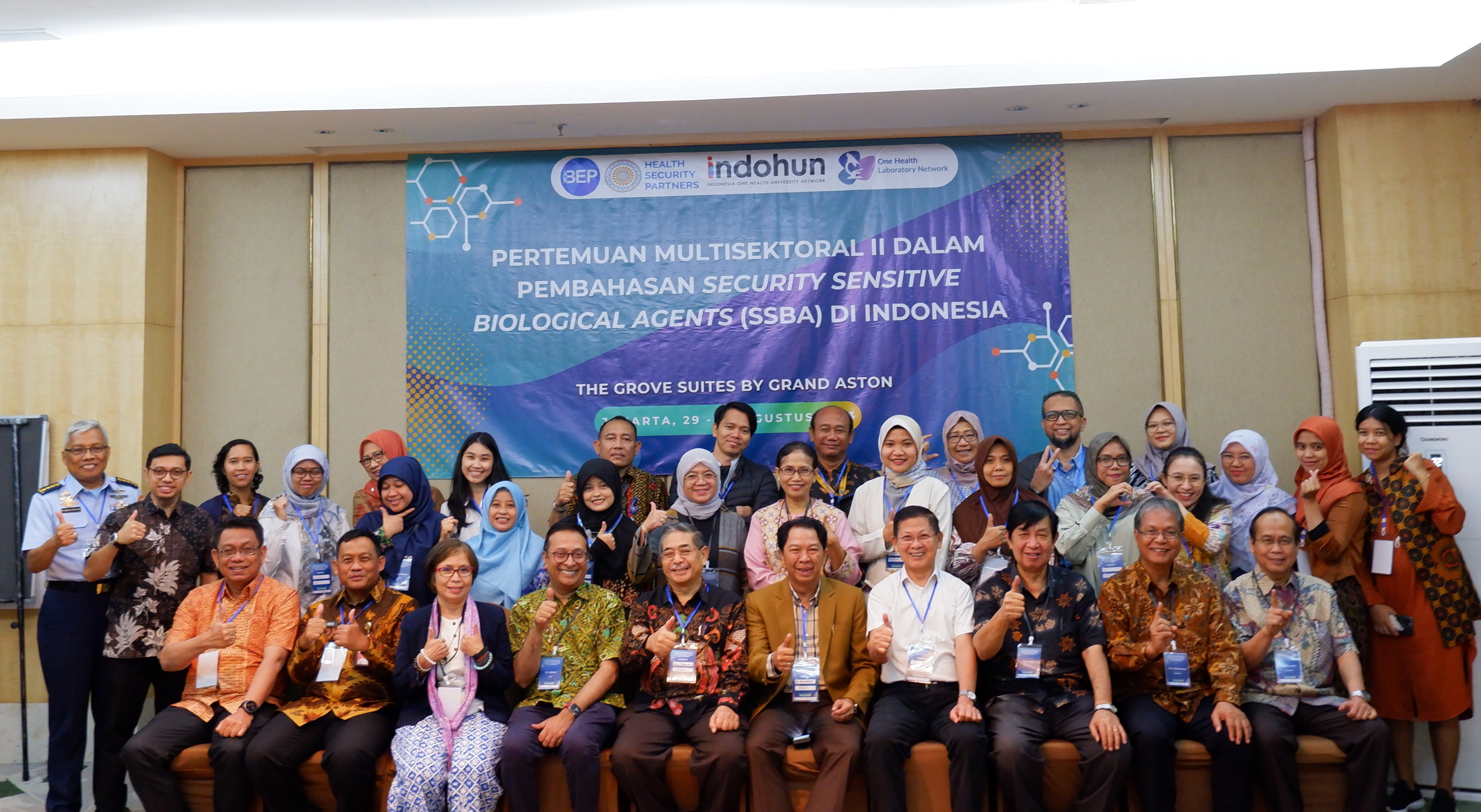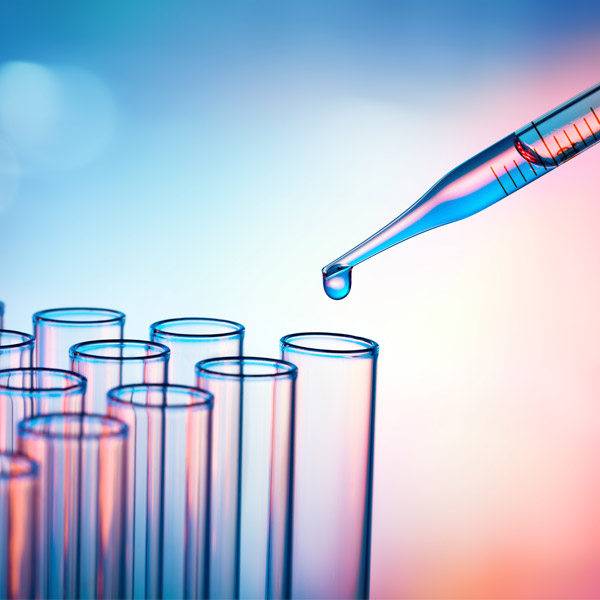Indonesia One Health University Network (INDOHUN) continues to strive to support the implementation of the laboratory biorisk management system (SMBL) through the One Health Laboratory Network (OHLN) program in university and government laboratories in order to improve safety and security in handling biological materials during the identification and detection of infectious diseases. emerging (PIE) and zoonoses.
As part of the initiation related to Laboratory Networking and Implementation of the Laboratory Biorisk Management System, INDOHUN through the One Health Laboratory Network (OHLN) program in collaboration with the Biosecurity Engagement Program (BEP) through Health Security Partners (HSP) continues the initiation of the preparation and advocacy of Security Sensitive policies Biological Agents (SSBA) in Indonesia. This activity requires the support of experts from various sectors to contribute to a series of discussion, formulation and advocacy activities for the preparation of SSBA lists and policies in Indonesia.
On 14 – 15 March 2023, the First Multisectoral Meeting was held to discuss the list of Security Sensitive Biological Agents (SSBA) in Indonesia. As a series of these activities, INDOHUN held the II Multisectoral Meeting to continue discussions on the list and regulatory framework for Security Sensitive Biological Agents (SSBA) in Indonesia. This activity was carried out for 2 days, Tuesday – Wednesday, 29-30 August 2023, at The Grove Suites, 2nd Floor, EPI Room 4-5, Rasuna Epicentrum Area, Jakarta.
In this activity, INDOHUN invited various experts from various ministries and institutions, including:
- Indonesian Veterinary Microbiology Association (AMVI)
- Quarantine Agency, Ministry of Agriculture (Kementan RI)
- Health Development Policy Agency – Ministry of Health (Kemenkes)
- National Development Planning Agency of the Republic of Indonesia (Bappenas RI)
- National Research and Innovation Agency (BRIN)
- The National Standardization Agency of Indonesia (BSN)
- Legal Bureau of the Ministry of Agriculture of the Republic of Indonesia (Kementan RI)
- Legal Bureau of the Secretariat General of the Ministry of Defense of the Republic of Indonesia (Kemhan RI)
- Legal Bureau, Ministry of Environment and Forestry (KLHK)
- Legal Bureau, Ministry of Education, Culture, Research and Technology of the Republic of Indonesia (Kemendikbud Ristek RI)
- Directorate of Health, Ministry of Defense of the Republic of Indonesia (Kemhan RI)
- Directorate of Veterinary Public Health (Kesmavet), Ministry of Agriculture
- Directorate of Resources, Directorate General of Higher Education, Ministry of Education and Culture, Research and Technology of the Republic of Indonesia
- Directorate of Health Surveillance and Quarantine, Ministry of Health (Kemenkes)
- Directorate of Public Health Governance, Ministry of Health (Kemenkes)
- Director of Prevention and Control of Infectious Diseases, Ministry of Health (Kemenkes)
- Indonesian Veterinary Medical Association (IVMA)
- Ministry of Law and Human Rights of the Republic of Indonesia
- Coordinating Ministry for Human Development and Culture (Kemenko PMK)
- Coordinating Ministry for Political, Legal and Security Affairs of the Republic of Indonesia (Kemenko Polhukam RI)
- Ministry of Environment and Forestry (KLHK)
- Ministry of Foreign Affairs of the Republic of Indonesia (Kemlu RI)
- Ministry of Education, Culture, Research and Technology of the Republic of Indonesia (Kemendikbud Ristek RI)
- Mochtar Riady Institute For Nanotechnology (MRIN)
- Translational Development of Biopharmaceutical Products, PT Bio Farma
- Indonesian Microbiology Association (PERMI)
- Republic of Indonesia Police (POLRI)
- Center for Animal Quarantine and Animal Biosafety, Agricultural Quarantine Agency, Ministry of Agriculture
- POLRI Medical and Health Center
- Indonesian National Army Health Center (TNI Health Center)
- Farma Veterinary Center (Pusvetma), Directorate General of Animal Husbandry and Animal Health, Ministry of Agriculture (Kementan)
- Secretariat General of the Ministry of Health (Kemenkes)
- Republic of Indonesia Cabinet Secretariat (Setkab RI)
This activity was opened online by Dr. Julia Scordo as Biosecurity Engagement Program of the US Department of State (BEP/DOS), then continued with remarks by Mrs. Wahyuni Kamah as Biosecurity Engagement Program (BEP) Manager, USA Embassy – Jakarta, then remarks from Dr. Prasad Kuduvalli as Director of Scientific Programs, Health Security Partners (HSP), and final remarks by Prof. Dr. Agus Suwandono, M.PH., Dr.PH as coordinator of the Indonesian One Health University Network (INDOHUN).
On the agenda of the Second Multisectoral Meeting, the discussion on Security Sensitive Biological Agents (SSBA) was presented by Dr. Drh Joko Pamungkas regarding the Initiation of SSBA in Indonesia, including the introduction of the draft Indonesian SSBA list and the SSBA management framework – From the Initiation to the Results of the First Multisectoral Meeting.
After the presentation regarding the initiation of SSBA in Indonesia, it was continued with a group discussion: Building an SSBA Biosecurity Framework based on existing regulations. Multisectoral meeting participants were divided into 3 discussion groups, namely:
- Group 1, discussing: Health Law 2023: Parts/Chapter relating to laboratories and biological materials.
- Group 2, discussing: Law Number 21 of 2019 concerning Animal, Fish and Plant Quarantine: Parts/Chapter relating to animal quarantine.
- Group 3, discussing: Regulation of the Minister of Defense of the Republic of Indonesia Number 1 of 2022 concerning National Defense Policy in 2022: Parts/Chapters Related to the Threat of Biological Weapons
In this second multisectoral meeting, Dr Ni Ketut Susilarini, MS also conveyed 3 important points regarding the results of discussions at the previous SSBA Meeting I:
- Register SSBA and Create SSBA implementation workflow
- Key elements of SSBA Biosecurity regulations.
- Review and complete the draft Biosecurity Guidelines for SSBA Organizing Institutions.
The next discussion session was Group Discussion to Create Consensus using the World Café Method . This discussion is also divided into 3 discussion group topics, namely:
- Group 1: Register SSBA and Create SSBA implementation workflow, accompanied by a team of experts: Dr. Atit Kanti, M.Sc, Dr. drh. Susan M Noor, M.VSc
- Group 2: Key elements of SSBA Biosecurity regulations, accompanied by a team of experts: Aroem Naroeni, DEA, PhD, Ari Wulan Sari, SKM, MPH
- Group 3: Review and complete the draft Biosecurity Guidelines for SSBA Organizing Institutions , accompanied by a team of experts: dr. Ivan Sulistyo Nugroho, dr. Ni Ketut Susilarini, MS
Multisectoral Meeting II to discuss Security Sensitive Biological Agents (SSBA) in Indonesia for two days has been successful. This event is clear evidence of collaboration between various teams of experts from various policy sectors to maintain the security and biological security of our country. In these two days, we have deepened our understanding of SSBA and various related aspects.
Intensive discussions and exchange of knowledge between the participants have resulted in a strong agreement in formulating the list and regulations related to SSBA in Indonesia. This is an important milestone in our efforts to keep our country safe and secure from potential biological threats. This agreement reflects a shared commitment to protect our communities and environment from the potential risks of SSBA.
We would like to thank all participants who actively contributed to this meeting. Strong cross-sector collaboration like this is key to ensuring success in addressing biosecurity challenges. With the end of this meeting, the minutes of the agreement resulting from the second phase of the multi-sector meeting will soon be prepared. This document will serve as a guide in developing SSBA regulations in Indonesia.
We hope that the results of this meeting will have a positive impact on our efforts to maintain biological security in Indonesia. The II Multisectoral Meeting to discuss Security Sensitive Biological Agents (SSBA) in Indonesia marked an important step in the development of related regulations. The next stage will involve hearings and advocacy meetings as a follow-up to the development of SSBA regulations to discuss and ensure improvements to SSBA regulations that are in line with relevant safety needs and standards. This step is an integral part of the government’s efforts to ensure strict and effective control of security-sensitive biological agents, which will help maintain national security and prevent potential threats to society and the environment.




Leave a Reply